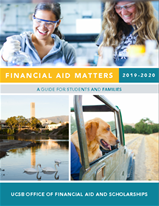Financial Aid Matters Guide for Students and Parents
11/16/2018
We view financial aid as an investment that requires a partnership between our office, students and parents. It requires open communication and collaboration from the point of filing the first application to loan repayment after graduation.

Financial Aid Matters Guide
A Guide for Students and Parents
We developed this resource in hopes of providing you the information you should know about your student’s financial responsibilities, including:
- How to navigate the award letter and determine net costs
- The verification process and important dates and deadlines
- How the cost of attendance and financial aid eligibility is determined
- Loan options, budgeting, smart borrowing, and repayment
- Billing, disbursements, authorization of charges, and refunds
- Term and conditions, revisions, and return of aid
- Special circumstances and appeals
Moving Off Campus?
11/07/2019
How moving to off-campus housing will affect Financial Aid
Many college students, specifically juniors and seniors, will live off-campus at one point or another during their college career. While living off campus can be rewarding, it does present new responsibilities and some challenges.
Below are some important things to think about and some of the most commonly asked questions about moving off campus and how it will affect the financial aid award letter and general process.
In preparation for moving off-campus, here are some important things to plan for:
- Finding the right apartment that fits within your student budget.
- Coming up with the security deposit and first months rent.
- Considering expenses like utilities, transportation and food.
Frequently Asked Questions:
How will my financial aid be calculated if I live off-campus?
Your financial aid will be calculated based on the off-campus budget which includes tuition and fees, housing and food, books and supplies, health care, transportation and personal expenses which are based on the 9 month academic year. Since the cost of living off-campus varies for each student depending on where you live and your spending habits, we use a standard cost of attendance estimate for all students. Given that the estimated cost of living off-campus is less than the cost of university housing, students may see a reduction in their financial aid.
Does the off-campus budget allow money for rent and food?
Your accepted financial aid, except for Federal Work-Study, is applied to your billing charges first. If your financial aid is more than the charges on the billing account, you will have a refund due to you that can be used to pay for the off-campus housing expenses, including food.
Note - Room and board expenses for the summer months are not part of the calculation of your financial aid. Your financial aid for the academic year will be based on the 9 month period; fall, winter and spring. Therefore, any refunds received should be budgeted appropriately and are not intended to help meet summer expenses.
Are there loans available for my off-campus living expenses?
Yes, Federal Direct Loans, including the parent PLUS loan or a private alternative loan are available to meet these expenses. Off-campus living expenses are included in your total budget, so loans can be borrowed to cover them.
What if my monthly rent is more than the amount included in the cost of attendance per month?
If your actual rent cost does exceed the financial aid estimate, it may be possible for you to borrow an additional amount for living expenses, but that is dependent on your eligibility and availability of loan funds. Be aware that you will incur start-up costs for your apartment (security deposits, phone installation, furnishing, etc.) that are not a part of the financial aid budget.
Schedule a Time to Visit that Works for You!
04/04/2019
With QLess, you can schedule a visit or join a virtual line:
- On our website’s homepage
- By texting OFAS to 805-585-5821
- Using the QLess app on their mobile phones
- On the kiosk in our lobby
Once in the virtual line, students can wait where they want and will be provided text updates on where they are in line and predictive wait times so students know when we are ready to serve them.